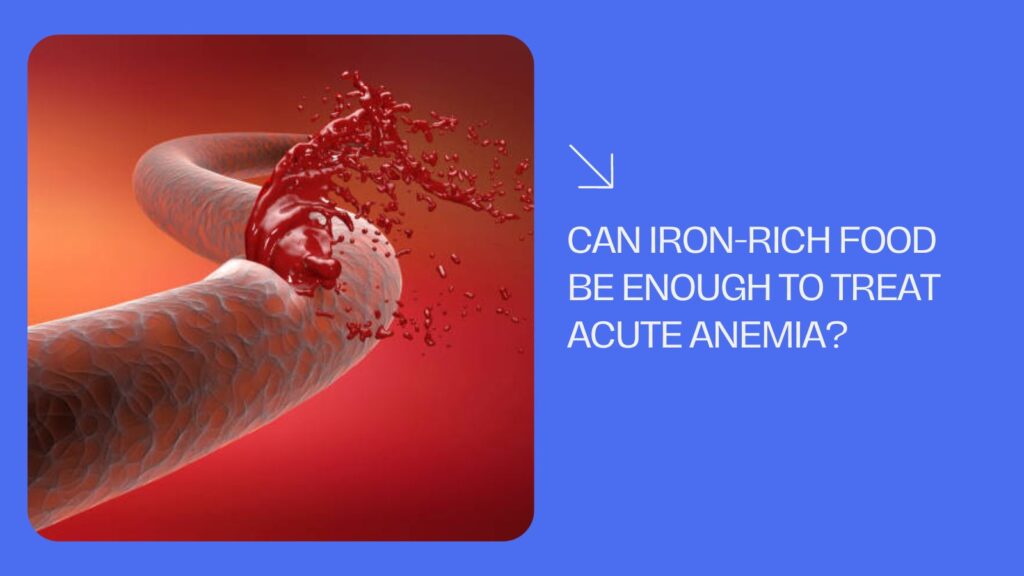While there are effective treatment options for anemia in medical science, some people think that by consuming iron-rich food they can cure their acute anemic condition. Are foods rich in iron sources enough to cure acute anemia? Let us explore.
Anemia and Acute Anemia
Anemia is a condition that occurs when the body does not have enough healthy red blood cells to carry oxygen to tissues and organs. It can be caused by various factors, including a poor diet, chronic diseases, pregnancy, and blood loss. Acute iron deficiency anemia is a condition where the body lacks enough healthy red blood cells due to a lack of iron which happens within a sudden short period of time. In other words, there is an abrupt drop in RBCs to cause acute anemia. This sudden iron loss can happen due to excessive bleeding or sudden loss of blood due to medical emergencies or trauma.
Acute Anemia Symptoms
- Headache
- Chest Pain
- Tinnitus (Hearing sound in the ears)
- Shortness of Breath
Iron-Rich Foods for Anemia
Iron is an essential mineral that the body needs to produce red blood cells. Some natural remedies for anemia involve increasing the intake of iron-rich foods, such as:
- Red meat
- Poultry
- Fish
- Beans
- Lentils
- Spinach
Fact: Iron-rich foods are a legitimate way to help treat anemia. The body absorbs iron from food more easily than iron from supplements, and a diet rich in iron can help boost red blood cell production. This is particularly true of iron source from animals, called heme iron. This heme iron is absorbed readily by the body.
Reasons why Iron-rich Food alone cannot Fight Acute Anemia
While increasing iron intake through iron-rich foods can help in treating mild anemia, it may not be enough to cure acute iron deficiency anemia. Here are a few reasons why:
- Severity of Anemia: Acute iron deficiency anemia is a severe form of anemia that requires a high dose of iron to correct. The iron content in food may not be enough to meet the body’s increased demand for iron.
- Excessive bleeding – Incidents that can cause profuse bleeding like excessive bleeding piles, colon cancer, other types of cancers, excessive bleeding in ulcers or other internal organs, excessive bleeding while menstruating in women, surgical blood loss, trauma or accident, etc. Such excessive bleeding causing sudden iron deficiency cannot be compensated by having iron-rich food.
- Underlying Medical Condition: Sometimes, acute iron deficiency anemia can be caused by an underlying medical condition, such as gastrointestinal bleeding, that requires medical treatment to resolve. In such cases, taking iron-rich food alone may not be sufficient to address the underlying cause of anemia.
- Iron Absorption: The body’s ability to absorb iron from food varies, and not all types of iron are equally well-absorbed. For example, heme iron, which is found in animal products, is more easily absorbed than non-heme iron, which is found in plant-based foods. Additionally, some foods and drinks, such as tea and coffee, can hinder iron absorption. Generally for better iron absorption, an adequate amount of acid in the stomach and vitamin c is required.
- Individual Differences: Some people may have difficulty absorbing iron from food due to genetic factors, which can make it harder to treat acute iron deficiency anemia through dietary changes alone.
Treatment for Acute Anemia
The treatment of acute anemia depends on the underlying cause of the condition. Here are some common treatment options for acute anemia:
- Blood Transfusion: In severe cases of acute anemia, a blood transfusion may be necessary. This involves receiving a transfusion of healthy red blood cells to replace those that are deficient. Blood transfusions are typically done in a hospital setting.
- Treatment of Underlying Condition: If the anemia is caused by an underlying medical condition, such as a bleeding ulcer, the healthcare provider may recommend treatment for that condition. This may involve surgery, medication, or other interventions.
- Iron Supplements: If the anemia is caused by an iron deficiency, the healthcare provider may recommend iron supplements. These supplements can help the body produce more red blood cells, which can improve oxygen flow to tissues and organs.
- Diet Changes: If the anemia is caused by a lack of certain nutrients, such as iron or vitamin B12, the healthcare provider may recommend dietary changes or supplements to help address the deficiency.
While increasing iron intake through iron-rich foods can help in treating anemia, it may not be sufficient to cure acute iron deficiency anemia on its own. It is important to consult with your doctor to determine the underlying cause of anemia first and then the doctor would let you know the appropriate course of treatment.
